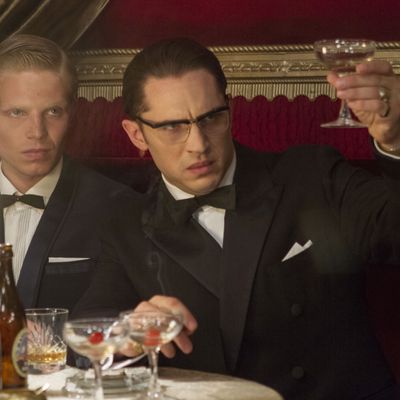
As versatile an actor as he is, Tom Hardy’s characters often come in one of two types: Charmingly intense rascals and surreal lunatics. Sometimes, as in this year’s Mad Max: Fury Road, he mixes the two a bit, letting us bask in his deranged nihilism before reclaiming hero status. Now, writer-director Brian Helgeland’s Legend gives Hardy a chance to perform both sides at once. Here, the actor plays identical twins Ronnie and Reggie Kray, the infamous gangsters who alternately charmed and terrorized London in the 1950s and 60s. They may be identical twins, but the differences between them are not subtle. It’s a testament to Hardy’s talents that, watching Legend, one finds it hard to believe that these two men share the same DNA; his characterizations are that distinct.
Reggie Kray is the charmer here, and Hardy plays him in full-on leading man mode: Obscenely handsome, and forever at war between his potential for violence and an innate, honor-among-thieves type of decency. The film is narrated by Frances (Emily Browning), the young sister of one of the Krays’ henchmen, who meets Reggie one day when he comes to her door looking for her brother; right then and there, she falls for this slick smooth-talker who sensuously shares a lemon candy with her. We fall for him, too. Even though know this relationship won’t end well — not just because this is a gangster movie, but also because Frances tells us in voice-over, “It took a lot of love for me to hate him the way I did.”
Ronnie Kray, on the other hand, is a dread, stylized beast straight out of the Hardy pantheon, right there alongside Bane from The Dark Knight Rises and Charlie Bronson in Bronson. We’re told that Ronnie was forever broken by a stint in prison. Early on, a psychiatrist who’s been coerced to give him a clean bill of health briefly breaks rank to tell Reggie that Ronnie is “fucking batty.” In contrast to the rakish, confident Reggie, Hardy gives Ronnie a hunched posture and a gaze that’s as much befuddled as it is unsettling, along with a loose lower lip that makes his words come out in a menacing warble. Watching Ronnie, it feels almost as if he’s communing with an alternate reality — which, when you think about it, he basically is.
Alas, the rest of the film can’t match Hardy’s energy. Using long fluid shots and dollops of period pop, Helgeland goes for a Goodfellas-style feel, but missing is the hubbub of activity around the Krays, the colorful cadre of heavies and hangers-on that Martin Scorsese could deftly turn into a whole distinct ecosystem. It’s not that they’re not there – Paul Bettany and David Thewlis are among the fine actors who show up in supporting roles — but the world beyond Ronnie and Reggie doesn’t quite come to life. It feels strangely impoverished.
In part, that’s because the film feels a bit rudderless, an episodic jumble of scenes and moments, loosely held together by Reggie and Frances’s star-crossed, doomed romance, by Ronnie’s gathering paranoia, a brief foray into the Krays’ blackmailing activities (it helps that Ronnie hosted debauched gay sex orgies) and a Scotland Yard investigation led by Detective Leonard Read (Christopher Eccleston, strangely underused). So maybe it’s not so surprising that Hardy’s at his best when playing against himself. The film’s two highlights are a knock-down, drag-out, nose-splitting, eye-gouging fight between the Krays, and an unnaturally tense confrontation at their mom’s house late in the film after Ronnie crosses one too many lines. In this latter scene, watching the two brothers trade polite banter with their dear old mum while speaking in code and sending deathly stare-signals to each other is deliriously exciting. Hardy, it seems, is an ecosystem of love and hate and betrayal and madness unto himself. The rest of Legend just can’t keep up.


